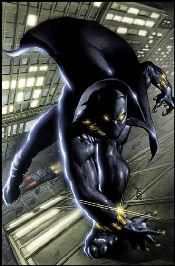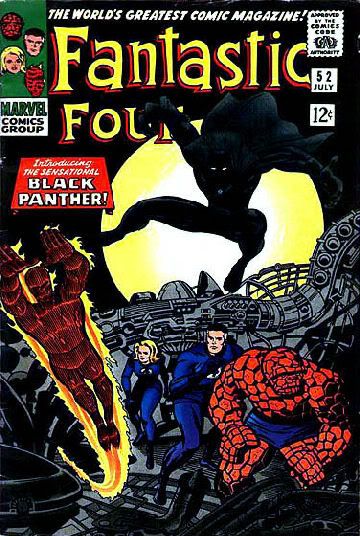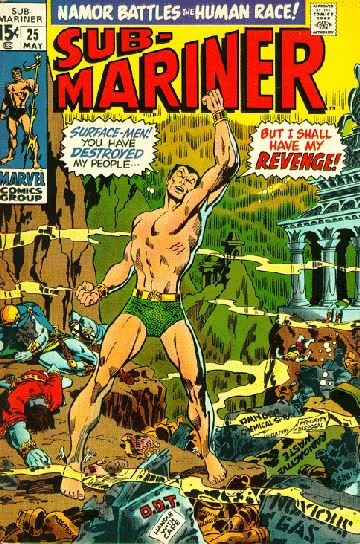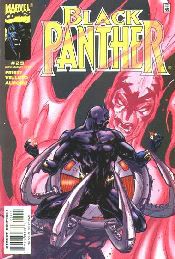 At the fan site Avengers Forever, Joe Casey talks about the upcoming sequel to Avengers: Earth’s Mightiest Heroes. One bit that may irk fans of Christopher Priest’s run on Black Panther is that T’Challa will be featured in the sequel and while Casey doesn’t plan to retcon a particularly controversial revelation from Priest's series - that the African monarch had joined the Avengers solely to spy on them (revealed in Black Panther #8, of Priest’s volume obviously, not the current one) - he also doesn’t intend to "mention it, reference it, or ever allude to it as a concept that could possibly exist in the context of EMH2."
At the fan site Avengers Forever, Joe Casey talks about the upcoming sequel to Avengers: Earth’s Mightiest Heroes. One bit that may irk fans of Christopher Priest’s run on Black Panther is that T’Challa will be featured in the sequel and while Casey doesn’t plan to retcon a particularly controversial revelation from Priest's series - that the African monarch had joined the Avengers solely to spy on them (revealed in Black Panther #8, of Priest’s volume obviously, not the current one) - he also doesn’t intend to "mention it, reference it, or ever allude to it as a concept that could possibly exist in the context of EMH2."His reasons?
"I’ve got tons of respect for Priest but there’s no way in hell I can get behind the idea of the Panther spying on the Avengers. Sorry to any readers who dug that particular revelation, but I happen to take my heroes’ nobility very seriously and that’s just not something the Panther I grew up reading would ever do."
I was a big fan of Priest’s Black Panther series, and never complained much about this part of the run. I thought it fit with a guy whose strategy for enlisting the aid of the Fantastic Four was to invite them to his country and subsequently beat them up one-by-one in order to test their abilities.

More importantly, it seemed like the answer to a glaring question. Why would the ruler of a nation, already bogged down with the necessarily hectic schedule any head of any nation would be victim to, spend so much time outside his country having adventures with guys in spandex UNLESS he has ulterior motives?
The more I thought about it though, the more I realized this revelation of Priest’s had always quietly rubbed me the wrong way. Not because it compromised the nobility Casey speaks of, but purely for practical reasons. The Black Panther joined the Avengers in Avengers #52. Judging by the appearances (and lack thereof) of Panther on the covers of the series, he left somewhere around Avengers #87. He rejoined in Avengers #105, and left again some time after Avengers #126. Those two stretches alone equal 56 issues. That’s a pretty significant amount of time. While I can totally buy that Black Panther would have initially joined the group in order to gather information on them, what doesn’t fly is that he would stay with them for so long. You would think it wouldn’t take him too long to figure out that the group had no plans or intentions to threaten Wakanda in any way.
It’s an interesting paradox. Yes, it does seem silly for the head of an African nation surrounded by potential enemies and threatened by its own superhuman menaces - not to mention all the problems any nation is prone to deal with - to join an American supergroup out of pure altruism. It doesn’t seem as silly for him to join with the goal of covert information-gathering, but it still doesn’t make sense for him to stay as long as he did. In fact, either scenario makes him look damn irresponsible.
And it seems it’s a paradox that exists for all comic book characters who exist as both superhero and nation ruler. If a writer wants to use a character like Black Panther, Aquaman, Sub-Mariner, or even Black Bolt as a superhero protagonist, the usual justification is to have that character temporarily lose control over his nation. I don’t know as much about either Black Bolt or Aquaman (though I know Aquaman did lose his throne at the start of his current series), but I know of at least three separate cases in which Sub-Mariner lost his kingdom. He lost it before he first joined the Avengers, he lost it some time post-Heroes-Reborn (if I remember correctly his efforts to regain his throne were chronicled in the short-lived second volume of Marvel Team-Up), and most recently lost it in the Busiek/Larsen Defenders series. And those are only the instances I know about.
So to make a super-powered ruler a super-powered hero, you pull out the rug from under his throne. It renders places like Atlantis and Wakanda difficult nations to hold on to. Both make Eastern Europe look like a pillar of political stability. Their nations are made more volatile to facilitate their freedom to be superheroes, and they refuse to curb their superhero exploits in order to lessen the instability of their nations.
It opens up an interesting opportunity that, to my knowledge, has never been exploited. Is it possible to write a superhero series about someone like Sub-Mariner or Black Panther, in which the main character acts solely as ruler of his nation? Sure, in both Sub-Mariner’s 1960's series and Priest’s Black Panther the heroes went on their various adventures specifically to safeguard their respective nations, but in the end that just comes off as a convenient excuse to make a head-of-state a crimefighter. Sure, T’Challa travels to America in the beginning of Priest’s run to find out who’s conspiring against his throne; but he’s still the monarch of Wakanda spending most of his time on another continent; and he’s still having monthly fisticuffs with people like Kraven The Hunter and Klaw. You can cry out “He’s a head-of-state, not a superhero” from the rooftops as much as you want; he still looks and acts like a superhero. He’s still in a funny costume beating up other people in funny costumes.
You could argue that being the head-of-state in a world of superheroes necessitates some ass-kicking every now and then, but wouldn’t it make sense for someone like Aquaman or Sub-Mariner to find other people to ass-kick for them so they could spend the bulk of their time on such inconsequential tasks as feeding people and making sure Attuma’s army doesn’t overrun the kingdom ONE MORE TIME? I mean Wakanda’s got all that vibranium and Atlanteans are supposed to be ass-kickers from birth, so you’d think there would be no lack of natives of either land wanting to throw on the spandex and go on adventures.
You could also argue that in a lot of these cases, fictional cultures like those of Wakanda or Atlantis (i.e. monarchies) demand that their heads-of-state be both sovereign and warrior, just as medieval European monarchs were often expected to physically lead their armies onto the battlefield. But there’s a big difference between leading armies to victory over foreign powers, and fighting Hydro-Man in a commercial jet over NYC. And regardless of cultural justifications, it still just feels like a thin excuse to send an executive ruler on adventures against supervillains. Forty-plus years of Air Force One.

I guess I just feel that Marvel and DC both have a rich history including fictional and fantastical nations, that it might be interesting to take a look at the necessarily bizarre diplomacy practices and politics of such realms without simply acting as pretext for more action/adventure. The only examples I can think of that come close to this are Ex Machina and Empire, though as far as I know neither took or take place in cooperative universes.
Also, it adds a gray area to the usual black-and-white morality of superhero stories, specifically in the case of the "no-killing" policy of the traditional superhero. This is something Priest touched on in Black Panther. I believe as early as the first issue of the series, Black Panther warns his bodyguards the Dora Milajae (hope I spelled that right) to not kill their combatants because they were in a country (presumably unlike Wakanda) that frowned on such practices.
 Later, in Black Panther #29, after T’Challa defeats Klaw he attempts to kill the villain and is physically yanked off the guy by a bunch of civilian bystanders.
Later, in Black Panther #29, after T’Challa defeats Klaw he attempts to kill the villain and is physically yanked off the guy by a bunch of civilian bystanders.The idea of superheroes being pushed over the edge and attempting to murder supervillains isn’t a particularly new or riveting subject, but this isn’t exactly the same. This isn’t like Batman trying and failing to murder the Joker at the end of "Death in The Family" in retaliation for Robin's death. Black Panther is a head-of-state. Klaw tried to murder him. Klaw tried to murder a head-of-state and even in more so-called "civilized" cultures in the real world, attempting to kill a head-of-state is likely to get you executed if not torn to pieces by an angry mob or shot in a parking garage by an angry mobster. Assuming, for example, that Lee Harvey Oswald did kill JFK (I know, I know, but I’m just not going to go there right now), he would almost assuredly have been legally executed had he been tried and convicted. And even the most hated despot wouldn’t be bad-mouthed by foreign powers for executing someone who had attempted to assassinate him. Considering this, Black Panther might not only be considered morally justified in killing Klaw, but absolutely obligated to do so, particularly if he comes from a nation whose rulers are required to eat poisonous roots and fight in bare-chested, violent rituals in order to justify their ascent to power. It adds an element of moral ambiguity to the world of super-people, something that world desperately needs (beyond the thin bad-ass factor of characters like the Punisher).

No comments:
Post a Comment